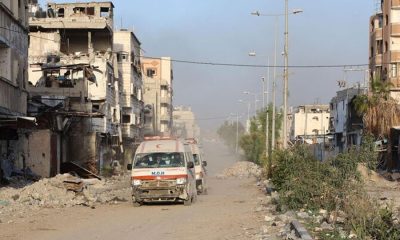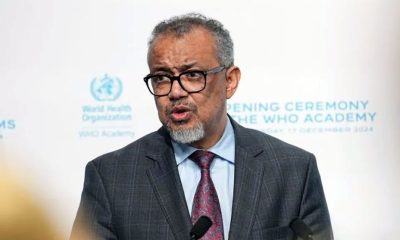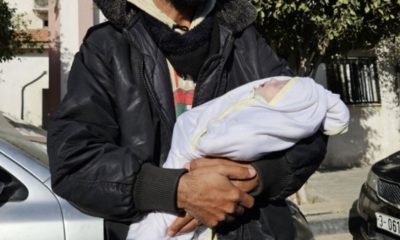International
Israel’s presence in occupied Palestinian territories illegal – UN court
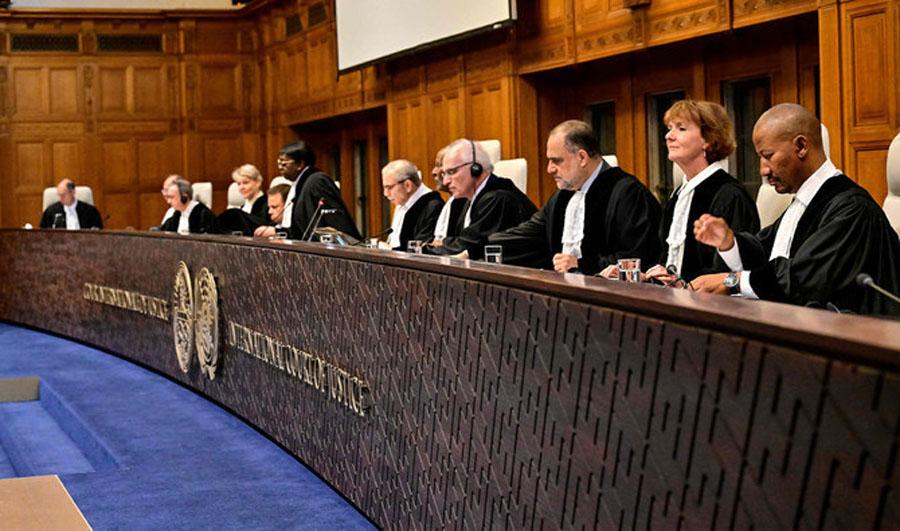
Israel’s presence in occupied Palestinian territories illegal – UN court
THE HAGUE, Netherlands: The top UN court said Friday that Israel’s presence in the occupied Palestinian territories is “unlawful” and called on it to end and for settlement construction to stop immediately, issuing an unprecedented, sweeping condemnation of Israel’s rule over the lands it captured 57 years ago.
Israeli Prime Minister Benjamin Netanyahu quickly denounced the nonbinding opinion issued by the 15-judge panel of the International Court of Justice, saying the territories are part of the Jewish people’s historic “homeland.” But the resounding breadth of the decision could impact international opinion and fuel moves for unilateral recognition of a Palestinian state.
The judges pointed to a wide list of policies, including the building and expansion of Israeli settlements in the West Bank and east Jerusalem, use of the area’s natural resources, the annexation and imposition of permanent control over lands and discriminatory policies against Palestinians, all of which it said violated international law.
The court said Israel had no right to sovereignty in the territories, was violating international laws against acquiring territory by force and was impeding Palestinians’ right to self-determination. It said other nations were obliged not to “render aid or assistance in maintaining” Israel’s presence in the territories. It said Israel must end settlement construction immediately and that existing settlements must be removed, according to a summary of the more than 80-page opinion read out by court President Nawaf Salam.
Israel’s “abuse of its status as the occupying power” renders its “presence in the occupied Palestinian territory unlawful,” the court said, saying its presence must be ended as “rapidly as possible.”
READ ALSO:
- Rivers: Appeal Court dismisses suit against Tinubu, Fubara, others
- Dele Momodu, Doyin Okupe disagree over Tinubu administration’s policies
- Fed govt unveils roadmap for Africa’s digital revolution under AfCFTA
The court’s opinion, sought by the UN General Assembly after a Palestinian request, came against the backdrop of Israel’s devastating military assault on Gaza, which was triggered by the Hamas-led attacks in southern Israel on Oct. 7. In a separate case, the International Court of Justice is considering a South African claim that Israel’s campaign in Gaza amounts to genocide, a claim that Israel vehemently denies.
The court said the General Assembly and Security Council — where staunch Israeli ally the United States holds a veto — should consider “the precise modalities” to end Israel’s presence in the territories.
Israel, which normally considers the United Nations and international tribunals as unfair and biased, didn’t send a legal team to the hearings. Instead, it submitted written comments, saying that the questions put to the court are prejudiced and fail to address Israeli security concerns. Israeli officials have said the court’s intervention could undermine the peace process, which has been stagnant for more than a decade.
“The Jewish people are not conquerors in their own land — not in our eternal capital Jerusalem and not in the land of our ancestors in Judea and Samaria,” Netanyahu said in a statement issued by his office, using the biblical terms for the West Bank. “No false decision in The Hague will distort this historical truth and likewise the legality of Israeli settlement in all the territories of our homeland cannot be contested.”
Speaking outside the court, Riad Malki, an adviser to Palestinian President Mahmoud Abbas, called the opinion “a watershed moment for Palestine, for justice and for international law.”
He said other nations must now “uphold the clear obligations” outlined by the court. “No actions of any kind … to support Israel’s illegal occupation.”
Hamas welcomed the court’s decision and said in a statement that “serious steps on the ground” need to be taken in response.
Israel captured the West Bank, east Jerusalem and Gaza Strip in the 1967 Mideast war. The Palestinians seek all three areas for an independent state.
Israel considers the West Bank to be disputed territory, whose future should be decided in negotiations, while it has moved populations there in settlements to solidify its hold. It has annexed east Jerusalem in a move that isn’t internationally recognized, while it withdrew from Gaza in 2005 but maintained a blockade of the territory after Hamas took power in 2007. The international community generally considers all three areas to be occupied territory.
READ ALSO:
- Refinery: Dangote defends product quality, says diesel 80% better than imported ones
- Arrest Philip Shaibu now over airport shooting, Edo govt tells police
- BREAKING: FCCPC fines Meta platforms $220m over ‘discriminatory practices’ in Nigeria
The court’s decision strikes at the heart of the ambiguity of Israel’s administration of the territories. Israel hasn’t annexed the West Bank — though settler groups have pressed it to do so — but it calls it part of its homeland and has effectively treated it as an extension of the nation. Along with the settlements, it has appropriated large swaths of the territory as “state lands.” At the same time, Netanyahu’s government has repeatedly rejected the creation of any Palestinian state. Abbas’ Palestinian Authority has been restricted to control over divided enclaves scattered around the West Bank.
The Palestinians presented arguments at hearings in February, along with 49 other nations and three international organizations. In the hearings, Malki accused Israel of apartheid and urged the United Nations’ top court to declare that Israel’s occupation of lands sought by the Palestinians is illegal and must end immediately and unconditionally for any hope for a two-state future to survive.
Erwin van Veen, a senior research fellow at the Clingendael think tank in The Hague, said before the decision that a ruling that Israel’s policies breach international law would “isolate Israel further internationally, at least from a legal point of view.”
He said such a ruling would remove “any kind of legal, political, philosophical underpinning of the Israeli expansion project.” It could also increase the number of countries that recognize a Palestinian state, in particular in the Western world, following the recent example of Spain and Norway and Ireland, he said.
It’s not the first time the ICJ has been asked to give its legal opinion on Israeli policies. Two decades ago, the court ruled that Israel’s West Bank separation barrier was “contrary to international law.” Israel boycotted those proceedings, saying they were politically motivated.
Israel says the barrier is a security measure. Palestinians say the structure amounts to a massive land grab, because it frequently dips into the West Bank.
The court said that Israel’s construction of settlements in the West Bank violated international laws prohibiting countries from moving their population into territories they occupy.
Israel has built well over 100 settlements, according to the anti-settlement monitoring group Peace Now. The West Bank settler population has grown by more than 15 percent in the past five years to more than 500,000 Israelis, according to a pro-settler group. Their residents are Israeli citizens governed by domestic law and served by government ministries, services, banks and other businesses — effectively integrating them into Israel.
Israel also has annexed east Jerusalem and considers the entire city to be its capital. An additional 200,000 Israelis live in settlements built in east Jerusalem that Israel considers to be neighborhoods of its capital. Palestinian residents of the city face systematic discrimination, making it difficult for them to build new homes or expand existing ones.
The international community considers all settlements to be illegal or obstacles to peace since they are built on lands sought by the Palestinians for their state.
Netanyahu’s hard-line government is dominated by settlers and their political supporters. Netanyahu has given his finance minister, Bezalel Smotrich, a former settler leader, unprecedented authority over settlement policy. Smotrich has used this position to cement Israel’s control over the West Bank by pushing forward plans to build more settlement homes and to legalize outposts.
Israel’s presence in occupied Palestinian territories illegal – UN court
ARAB NEWS
International
UK visa: British govt raises financial requirements for students, workers

UK visa: British govt raises financial requirements for students, workers
International students and skilled workers applying for visas to the United Kingdom will face higher financial requirements beginning January 2, 2025.
These changes, announced by the UK government, require applicants to show more money in their bank accounts to cover living expenses during their stay.
These updated regulations affect those hoping to study or work in the UK, with new financial thresholds set for students and skilled workers.
These changes are aimed at ensuring that applicants have the necessary financial resources to support themselves during their time in the UK.
Increased financial requirements for students
International students seeking a UK study visa will now need to show higher amounts of money to cover their living expenses. For students attending courses in London, the required amount is £1,483 per month, while students studying outside London will need to show £1,136 per month, TravelBiz reports.
READ ALSO:
- EFCC will bring down towers of corruption this year – Olukoyede
- Two online scammers arrested in Rivers for defrauding woman of N110m
- I stand by my comments – Bauchi gov replies Presidency
For a typical one-year master’s program, students must show £13,347 if studying in London, and £10,224 for those outside London. The funds must be held in the applicant’s bank account for at least 28 consecutive days before submitting the visa application.
Comparison with current financial requirements
According to reports, currently, the financial requirements are lower. For students in London, the monthly amount is £1,334, while those studying outside London need to show £1,023 per month. Under the new rules, these amounts will increase, placing additional financial burdens on prospective students.
Changes to skilled worker visa financial requirements
Skilled workers applying for a visa to the UK will also face new financial thresholds. According to reports, to qualify for a skilled worker visa, applicants must have an annual income of at least £38,700 to cover living expenses and accommodation. In addition, applicants must secure sponsorship from an employer approved by the Home Office.
Like student applicants, skilled worker visa applicants must demonstrate that they have the required funds in their account for at least 28 consecutive days before submitting their application if they do not have employer sponsorship.
Updated UK visa fees and exemptions
Visa application fees for 2025 have been revised to reflect inflation and improved services. The new fees for various visa categories are as follows:
- Short-term Visit (6 months): $153
- Long-term Visit (2 years): $573
- Long-term Visit (5 years): $1,023
- Long-term Visit (10 years): $1,277
- Skilled Worker Visa: $827
- Student Visa (Outside UK): $647
- Parent of Student Child Visa: $845
Priority visas are priced at $550, while super-priority visas cost $1,050. However, certain groups such as individuals with disabilities, carers, and professionals in specific sectors like healthcare, the armed forces, and talent-based roles will continue to benefit from fee waivers.
The 28-day rule for financial documentation
A key new regulation is the “28-day rule”. Applicants must ensure that the required funds remain in their bank account for at least 28 consecutive days, without dipping below the required amount.
Bank statements or certified letters submitted as part of the financial documentation must show that the closing balance is no older than 30 days when the visa application is submitted. Failure to comply with this rule may result in visa rejection
UK visa: British govt raises financial requirements for students, workers
International
Moscow attacks Ukraine with drones, missiles
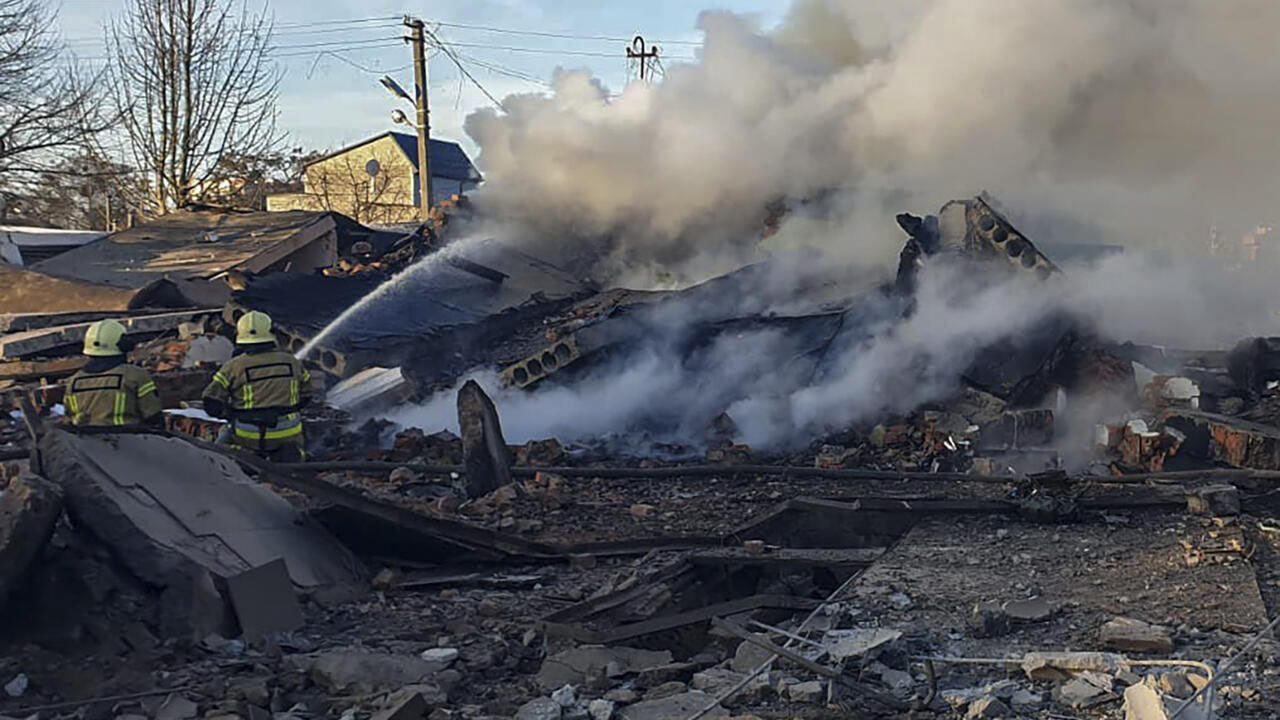
Moscow attacks Ukraine with drones, missiles
Kyiv said Tuesday that Russia had launched a barrage of drones and missiles across Ukraine, conceding that there were successful strikes in the east of the country and near the capital.
Authorities did not elaborate on what had been hit but in the wider Kyiv region, the governor said debris from a downed projectile had damaged a private home and wounded a woman.
Moscow said its forces had used attack drones and precision weapons in a “combined” assault on a military airfield and a munitions production facility, claiming that the targets were struck.
READ ALSO:
- Wanted terrorist commander, Bello Turji, a dead man walking – DHQ
- Court orders forfeiture of $49,700 linked to former INEC official
- DSS arrests activist Shehu Mahdi over post on French military base
The Ukrainian air force said Russia had launched 21 missiles of various types and 40 drones in the barrage, adding that seven missiles and 16 unmanned aerial vehicles were downed.
“As a result of the Russian attack, there were ballistic missile hits in Sumy and Kyiv regions,” the air force said.
Russia has launched aerial attacks on Ukraine at night almost every day since its forces invaded in February 2022, targeting military and civilian infrastructure, too, like energy facilities.
Ukraine has stepped up its own drone and missile attacks inside Russian territory in response, and urged its Western allies to supply more air defence systems.
A Ukrainian drone attack in western Russia caused a fuel spill and fire at an oil depot, a Russian regional governor said earlier Tuesday.
Moscow attacks Ukraine with drones, missiles
International
Catholic priest sentenced to 11 years for criticising his president

Catholic priest sentenced to 11 years for criticising his president
A Catholic priest in Belarus on Monday was convicted on charges of high treason for criticising the government and handed an 11-year sentence, in the first case of politically-driven charges against Catholic clergy since Belarus became independent after the Soviet Union collapsed in 1991.
The conviction and sentencing of Rev. Henrykh Akalatovich comes as Belarusian authorities have intensified their sweeping crackdown on dissent ahead of the Jan. 26 presidential election that is all but certain to hand authoritarian President Alexander Lukashenko a seventh term in office.
The Viasna Human Rights Centre said Akalatovich, 64, rejected the treason charges. The group has listed him among 1,265 political prisoners in the country.
“For the first time since the fall of the Communist regime, a Catholic priest in Belarus was convicted on criminal charges that are levelled against political prisoners,” said Viasna’s representative Pavel Sapelka. “The harsh sentence is intended to intimidate and silence hundreds of other priests ahead of January’s presidential election.”
Akalatovich, who has been in custody since November 2023, was diagnosed with cancer and underwent surgery just before his arrest. The priest from the town of Valozhyn in western Belarus, who was critical of the government in his sermons, has been held incommunicado, with prison officials turning down warm clothing and food sent to him.
Arkatovich is among dozens of clergy — Catholic, Orthodox and Protestant — who have been jailed, silenced or forced into exile for protesting the 2020 election that gave Lukashenko a sixth term. The disputed vote that the opposition and the West said was marred with fraud triggered mass protests,. The authorities then responded with a sweeping crackdown that saw more than 65,000 arrested and thousands beaten by police.
Catholic and Protestant clergy who supported the protests and sheltered demonstrators at their churches were particularly targeted by repressions. Belarusian authorities openly seek to bring the clergy into line, repeatedly summoning them for “preventive” political talks, checking websites and social media, and having security services monitor sermons.
While Orthodox Christians make up about 80% of the population, just under 14% are Catholic and 2% are Protestants.
Lukashenko, who has ruled Belarus for nearly 30 years and describes himself as an “Orthodox atheist,” lashed out at dissident clergy during the 2020 protests, urging them to “do their jobs,” and not fuel unrest.
Lukashenko is one of Russian President Vladimir Putin’s closest allies, allowing Russia to use his country’s territory to send troops into Ukraine in February 2022 and to deploy some of its tactical nuclear weapons in Belarus.
Catholic priest sentenced to 11 years for criticising his president
-

 Politics3 days ago
Politics3 days agoGbajabiamila speaks on his rumoured Lagos governorship ambition
-

 metro3 days ago
metro3 days agoFarotimi to pursue disbarment over arrest, defamation allegations
-

 Business2 days ago
Business2 days agoReal reason Dangote, NNPC drop petrol price — IPMAN
-

 Health2 days ago
Health2 days agoABU Teaching Hospital will begin kidney transplant in 2025 – CMD
-

 Sports1 day ago
Sports1 day agoAnthony Joshua prostrates before Governor Abiodun during Ogun visit
-

 metro3 days ago
metro3 days agoEl-Rufai accuses Tinubu govt of Yoruba agenda, Reno Omokri reacts
-

 metro3 days ago
metro3 days agoNigerian govt urged to intervene in Mozambique post-election violence
-

 Politics3 days ago
Politics3 days ago2027: Why PDP shouldn’t field northern presidential candidate – Ex-Atiku campaigner

